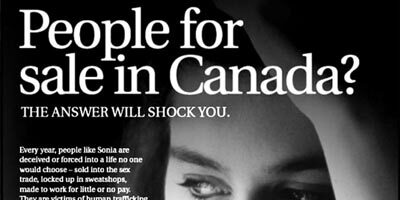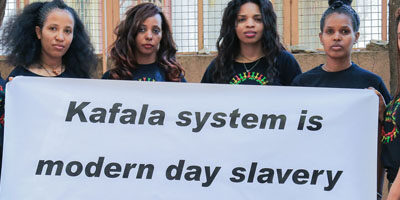Government minister alienates NGOs with charge of anti-Semitism
Canadian NGOs who receive funding from CIDA are worried about the state of their partnership. Many NGOs suspected change was in the air at CIDA as they experienced increasing wait times for responses on proposals. Their suspicious grew as the ministry announced new policy, such as its new countries of focus, without consulting them. “Serious issues are emerging about how CIDA’s partnerships are managed,” said Gerry Barr, President of the Canadian Council for International Cooperation (CCIC). “They are basically removing ‘partnership’ from the term “partnership organizations.””
Kairos funds cut
The latest signal of change came on November 30, 2009, when KAIROS, an ecumenical non-governmental organization that had previously enjoyed a productive partnership with CIDA, was told that its funding would not be renewed. No explanation was offered at the time.
When pressed, Minister of International Cooperation Bev Oda informed the organization that the decision to cut funding had been made by her office because the KAIROS projects requiring funding did not meet CIDA’s three new areas of focus: increasing food security, securing the future of children and youth and stimulating sustainable economic growth. KAIROS representatives were quick to point out that their funding did in fact address the three areas, and added that their proposal had been submitted in June 2009, before the new areas of focus were announced in September.
Barr also noted that the new themes had been created without NGO input, and that the themes change too quickly for NGOs to keep up. “CIDA has gone through 24 different priorities in the last seven years. Keeping up is like trying to plan next year’s crop on this year’s weather,” he said. One new area – sustainable economic growth – has not even been launched yet, he added. Those NGOs trying to align themselves with the new areas of focus would be dismayed to discover that guidelines for the new areas were unavailable online and a message directed them to follow the old guidelines.
Charges of anti-Semitism
Several weeks later, in a speech in Israel, Jason Kenney, Minister of Citizenship, Immigration and Multiculturalism, added a new dimension to the story by announcing in a speech at the Global Forum for Combating Anti-Semitism in Jerusalem, that funding to KAIROS and other organizations had been cut because they had been associated with anti-semitism. KAIROS, he claimed, had taken a leadership role in boycotting Israel.
KAIROS vigorously denied the accusation. “KAIROS has always supported the state of Israel and its right to live in peace,” said Mary Corkery, Executive Director of KAIROS. She said that KAIROS had criticized the actions of the Israeli government in the past, including its occupation of Palestinian land, but had never done so in an anti-semitic manner. Many members of the Canadian Jewish community also disagreed with Kenney’s accusation, and offered KAIROS support and donations in response.
Barr agrees that the characterization of KAIROS as anti-semitic is false. “KAIROS has been maligned, mischaracterized and wrongly charged,” he said. “And the government knows it.”
It was also rumoured that KAIROS’ funding might have been cut because of its criticism of the Canadian government’s response to climate change, or its relations with South American governments with a history of human rights abuses (particularly Colombia). KAIROS Manager John Mihevc also objected to these reasons for the funding cut, asserting, “We have had similar positions on these issues as other organizations.”
KAIROS remains optimistic that the government will respond or reverse their decision because the cut drew outrage from across Canada and received extensive media coverage. At the time of printing, KAIROS had demanded a meeting with Minister Oda but had not received a response.
In searching for a silver lining, Corkery notes that the funding cuts have returned debates on aid to the public agenda. “This event has set off a discussion across the country… about what aid is about, why a highly-placed government minister would call a church anti-Semitic, and how that term has been misused as a label,” she said.
Delays and uncertainty
KAIROS isn’t the only NGO whose funding is in peril. According to Liberal Critic for International Cooperation Glen Pearson, many Canadian NGOs signed partnerships with CIDA in 2005 under the Paul Martin Liberal government. Their contracts are now expiring and their renewal is uncertain. Pearson said that by the end of 2009, eight other organizations had been told their funding would not be renewed. Unlike KAIROS, they did not speak out against the funding cuts, perhaps to avoid jeopardizing CIDA funding to future projects.
Many organizations are still waiting to find out if their projects will be funded, or only received a response long after their project was submitted. Horizons of Friendship, an organization that partners with organizations in Mesoamerica to work on issues related to poverty and injustice, had their funding renewed at the beginning of January, a year and a half after their proposal was sent by CIDA officials to the minister’s office for approval. In the interim, Horizons and other organizations have survived on limited funds and experienced immense uncertainty about the future of their programs.
Barr attributes CIDA’s “glacial pace” to intense supervision of decisions by Oda. Proposals like that of KAIROS may be approved by the ministry but must wait for her approval or dismissal before being returned to their organizations.
According to Barr, CIDA is neglecting its partnerships with Canadian NGOs. They are not being consulted on changes to CIDA policy and their work is becoming less of a priority for CIDA. “CIDA is plagued by issues of transparency,” he said, making it difficult for organizations to navigate.
He says that another major problem with the organization is the political nature of CIDA’s decision-making which is not driven by Canada’s aid legislation and is often non-compliant with it. He points to Canada’s increasing concentration of aid in middle income countries as evidence.
Mihevc echoes Barr’s evaluation in suggesting that CIDA is shifting towards funding aid that delivers measurable results, while moving away from funding advocacy. “Advocacy is becoming a bad word,” he said. Such a shift ignores one CIDA’s fundamental goals of interacting with Canadians on policy issues. “CIDA is supposed to be engaging in educating and informing citizens so they can engage their politicians, both in Canada and in developing areas.”





